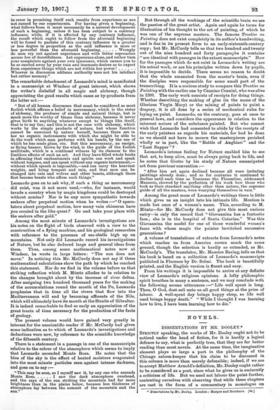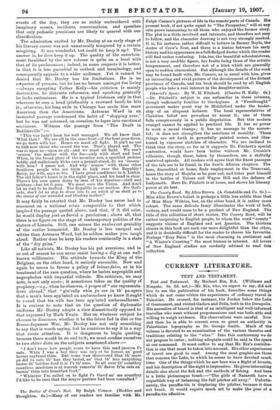NOVELS.
DISSERTATIONS BY MR. DOOLEY.*
STRICTLY speaking, the works of Mr. Dooley ought not to be noticed under the head of fiction, for it is hardly a logical defence to say, what is perfectly true, that they are far better reading than most novels. At the same time, the imaginative element playa so large a part in the philosophy of the Chicago saloon-keeper that his claim to be discussed in this column is more than merely defensible ; indeed, if we are to accept Matthew Arnold's definition, Mr. Dooley ought rather to be considered as a poet, since what be gives us is eminently a criticism of life. But we need not labour the point further, contenting ourselves with observing that while these chapters are cast in the form of a commentary in monologue on • Dissertations by Mr. Dooley. London s Harper and Brothers. [k]
events of the day, they are so richly embroidered with imaginary scenes, incidents, conversations, and speeches that only pedantic precisions are likely to quarrel with our classification.
The admiration excited by Mr. Dooley at an early stage of his literary career was not unnaturally tempered by a certain misgiving. It was wonderful, but could he keep it up P The answer is, be does keep it up. The quality of the entertain- ment furnished by the new volume is quite on a level with that of its predecessors ; indeed, in some respects it is better, in that it is less parochial in outlook and terminology, and consequently appeals to a wider audience, Yet it cannot be denied that Mr. Dooley has his limitations. He is no rekpecter of persons, but he has no heroes amongst the living —always excepting Father Kelly—his criticism is mainly destructive, he distrusts reformers, and speaking generally he lacks enthusiasm. He is a typical Irishman only in that wherever he sees a head (preferably a crowned head) he hits it ; otherwise, his long exile in Chicago has made him more American than the Americans. Artemus Wa•d in an immortal passage condemned the habit of "slopping over," but he was not ashamed, on occasion, to lapse into emotional sentiment. Witness the passage from "The Draft in "
"This war hain't been too well managed. We all know that. 'What' then ? We are all in the same boat—if the boat goes down, we go down with her. Hence we must all fight. It ain't no use to talk now about who caused the war. That's played out. The war is upon us—upon us all—and we must all fight. We can't 'reason' the matter with the foe—only with steel and lead. When, in the broad glare of the noonday sun, a speckled jackass boldly and maliciously kicks over a peanut-stand, do we 'reason' with him ? I guess not. And why 'reason' with those other Southern people who are tryin to kick over the Republic? Betsy, my wife, says so too. I have great confidence in A. Linkin. The old fellow's heart is in the right place, and his head is clear. There's bin sum queer doins by sum of his deputies—civil and military—but let it pass. We must save the Union. And don't let us wait to be drafted. The Republic is our mother. For God's 'sake, don't let us stop to draw lots to sea which of us shall go to the rescue of our wounded and bleeding mother."
It may fairly be retorted that Mr. Dooley has never had to comment on a national crisis comparable to that which inspired the passage quoted above, and that, if it did arise, he would display just as fervid a patriotism ; above all, that there is no figure on the stage of contemporary politics of the stature of Lincoln. Still, one misses the exuberant geniality of the earlier humonrist. Mr. Dooley is less unequal and wittier than Artemus Ward, but he seldom makes you laugh aloud. Rather does he keep his readers continually in a state of the "dry grins."
Like all satirists, Mr. Dooley has his pet aversions, and in or out of season he can never resist having a dig at one well- known millionaire. His attitude towards the King of the Belgians, on the other hand, is entirely excusable. Now and again be seems to favour a policy of laissez-faire, as in his treatment of the race question, where he lashes negrophils and negrophobes with impartial ridicule. His criticism, we may note, is not only acute ; it sometimes takes on the quality of prophecy,—e.g., when he observes, a propos of " our representa- tives abroad," that " gin'rally whin ye see in th' pa-apers that a man's been app'inted an ambassadors ye know it ought to r-read that his wife has been app'inted ambassadhress." It is curious to note that on the question of diplomatic uniforms Mr. Dooley adopts a view diametrically opposed to that expressed by Mark Twain. But on whatever subject he chooses to discourse, whether it be the latest fad in diet or the Russo-Japanese War, Mr. Dooley has not only something to say that is worth saying, but he contrives to say it in a way that rivets attention. It is dangerous to begin quoting, because there would be no end to it; we must confine ourselves to two obiter dicta on the subjects mentioned above :- "I don't know how people come to have this mad passion Yr oats. Whin I was a boy they was on'y et be horses, an' good horses rayf used thim. But some wan discovered that th' more ye did to oats th' less they tasted, an' that th' less annything tastes th' betther food it is Fr th' race. So all over th' counthry countless machinesis at wurruk removin' th' flavor fr'm oats an' tnrnin thim into breakfast food."
"Whiniver I'm called on to fight Fr Gawd an' me counthry I'd like to be sure that the senyor partner had been consulted."







































 Previous page
Previous page